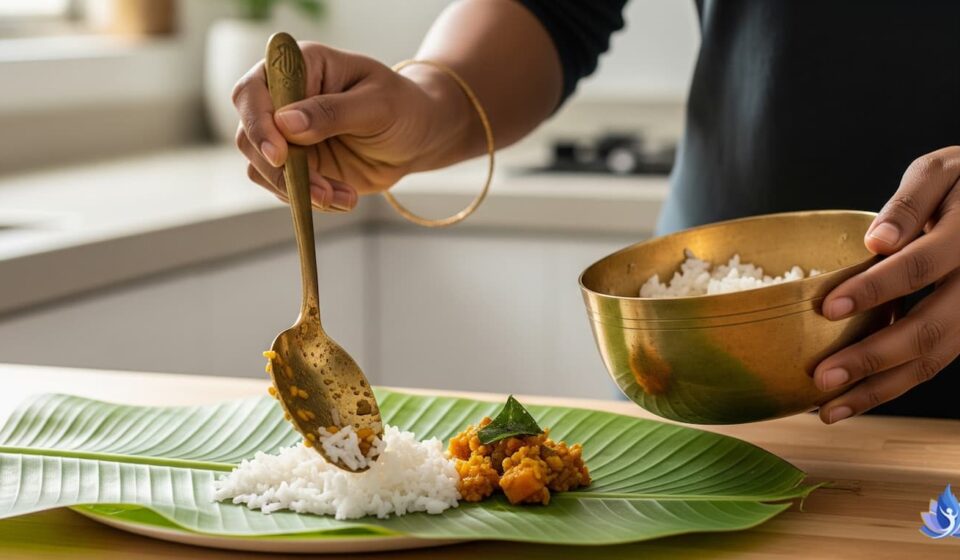In our modern world of abundance, leftovers are a fact of life. We pack them in containers, push them to the back of the fridge, and often forget about them until it’s too late. Food waste has become a global crisis, a symptom of a culture that has become disconnected from the source of its nourishment. But what if every meal was approached with a sense of sacredness that made waste unthinkable?
Table Of Content
Ancient Indic wisdom offers a powerful lens through which to view this issue: the concept of Uchchhishta (उच्छिष्ट). While often translated simply as “leftovers,” its meaning is far more profound. It refers to food that has been contaminated by saliva, making it ritually impure. This seemingly simple rule of hygiene contains a deep spiritual teaching about mindfulness, respect for food, and our relationship with the divine energy that sustains us.
Understanding Uchchhishta: More Than Just Leftovers
Uchchhishta is the concept that once food has come into contact with someone’s mouth or saliva, it becomes their personal remnant and is considered ritually impure for others. This is why, traditionally, Hindus do not share from the same plate, drink from the same glass, or use a spoon for tasting and then put it back into the main pot. It is a practice rooted in preventing cross-contamination.
However, the philosophy behind it goes deeper than hygiene. It fosters a profound mindfulness about the act of eating. By creating a clear boundary around the food one has claimed, it encourages a person to take only what they need, to be fully present with their meal, and to honor it as a sacred offering to their own body.
This stands in stark contrast to the modern habit of mindless eating—snacking from a shared bag while watching TV or piling a plate high at a buffet. These habits create waste because they are divorced from a conscious assessment of our true hunger and needs. The discipline of avoiding Uchchhishta forces us to be intentional from the very first serving.
Annam Brahma: Food as the Divine
The aversion to wasting food in Hindu philosophy is rooted in the powerful concept of Annam Brahma—”Food is God”. The Taittiriya Upanishad declares that from Brahman (the Ultimate Reality), all of life is born, and by food, it is sustained. Therefore, food is not merely a commodity; it is a manifestation of the divine life force itself.
When we see food through this sacred lens, wasting it becomes an act of disrespect, a spiritual transgression. It is akin to dishonoring the divine energy that has taken the form of nourishment to support our existence. This perspective elevates every meal to an act of worship and every kitchen to a sacred space. The goal is not just to manage leftovers, but to cultivate such a deep reverence for food that significant waste is never created in the first place.
अन्नाद्भवन्ति भूतानि पर्जन्यादन्नसम्भवः। यज्ञाद्भवति पर्जन्यो यज्ञः कर्मसमुद्भवः।।
annād bhavanti bhūtāni parjanyād anna-sambhavaḥ yajñād bhavati parjanyo yajñaḥ karma-samudbhavaḥ
All living beings subsist on food, and food is produced by rain. Rains are produced by the performance of yajña (sacrifice), and yajña is born of prescribed duties. — Bhagavad Gita 3.14
This verse illustrates the sacred cycle of existence, placing food at the center of a cosmic process that connects our actions (karma) to the divine order. Wasting food is a disruption of this sacred cycle.
Applying the Wisdom of Uchchhishta in Your Modern Kitchen
You don’t need to follow ancient rituals to embrace the spirit of Uchchhishta. It is a mindset that can be applied in any kitchen to cultivate mindfulness and dramatically reduce waste.
1. Serve with Intention: Instead of placing large serving dishes on the table for a free-for-all, serve each person a modest portion. Encourage everyone to finish what is on their plate before taking more. This simple act prevents the creation of excessive plate waste, the most common form of Uchchhishta.
2. Practice the “First Serving” Rule: When cooking, before you taste the food, set aside a portion for others or for a later meal. This ensures that the main pot remains “pure” and uncontaminated, making the food more appealing to be eaten later. This is the practical application of not using a tasting spoon twice.
3. Transform, Don’t Trash: See leftovers not as a burden, but as a creative opportunity. Yesterday’s rice can become today’s fried rice. Leftover vegetables can be blended into a soup or added to an omelet. This honors the principle of Annam Brahma by ensuring that the divine energy in the food is fully utilized.
4. Share Your Abundance: If you have cooked too much, share it. Offer a plate to a neighbor, a security guard, or someone in need. In Hindu tradition, feeding others (Annadana) is considered one of the highest forms of service. This transforms a potential act of waste into an act of merit.
Conclusion: From Mindless Consumption to Sacred Sustenance
The concept of Uchchhishta is a powerful reminder that our relationship with food is a reflection of our inner state. A culture of waste is born from a mindset of disconnection and disrespect. By embracing the simple yet profound wisdom behind this ancient principle, we can begin to heal that disconnect.
It invites us to see every meal as a sacred ritual, every ingredient as a divine gift, and our kitchen as a temple. When we eat with this level of mindfulness and gratitude, reducing waste is no longer a chore; it is a natural and joyful expression of our reverence for life itself.
The way we treat our food reflects our inner state. What is one small change you can make in your kitchen to honor the principle of Annam Brahma? Share your ideas in the comments below, pass this article on to inspire others, and follow us on social media for more conscious living tips.

